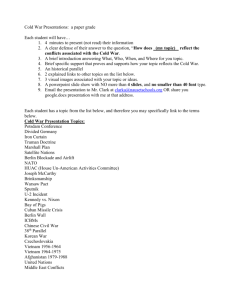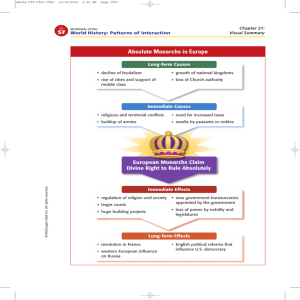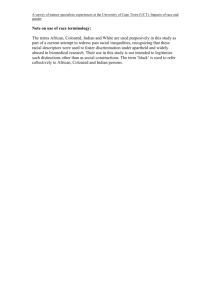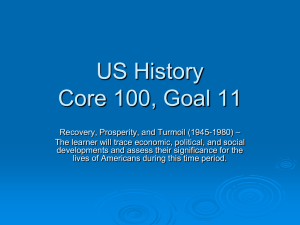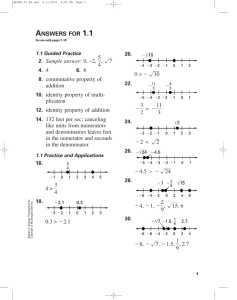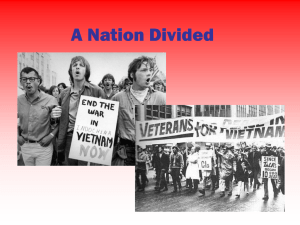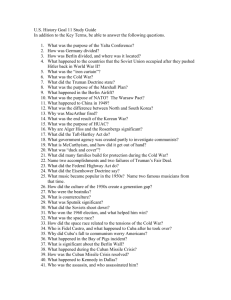Key Terms in American History
advertisement
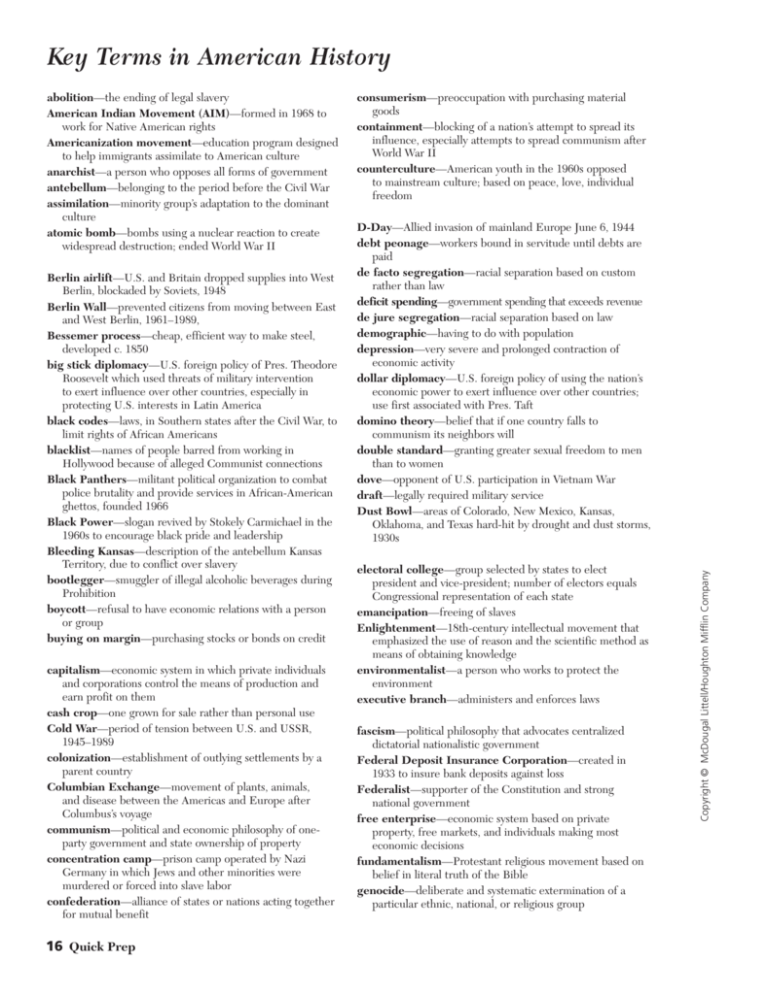
Key Terms in American History Berlin airlift—U.S. and Britain dropped supplies into West Berlin, blockaded by Soviets, 1948 Berlin Wall—prevented citizens from moving between East and West Berlin, 1961–1989, Bessemer process—cheap, efficient way to make steel, developed c. 1850 big stick diplomacy—U.S. foreign policy of Pres. Theodore Roosevelt which used threats of military intervention to exert influence over other countries, especially in protecting U.S. interests in Latin America black codes—laws, in Southern states after the Civil War, to limit rights of African Americans blacklist—names of people barred from working in Hollywood because of alleged Communist connections Black Panthers—militant political organization to combat police brutality and provide services in African-American ghettos, founded 1966 Black Power—slogan revived by Stokely Carmichael in the 1960s to encourage black pride and leadership Bleeding Kansas—description of the antebellum Kansas Territory, due to conflict over slavery bootlegger—smuggler of illegal alcoholic beverages during Prohibition boycott—refusal to have economic relations with a person or group buying on margin—purchasing stocks or bonds on credit capitalism—economic system in which private individuals and corporations control the means of production and earn profit on them cash crop—one grown for sale rather than personal use Cold War—period of tension between U.S. and USSR, 1945–1989 colonization—establishment of outlying settlements by a parent country Columbian Exchange—movement of plants, animals, and disease between the Americas and Europe after Columbus’s voyage communism—political and economic philosophy of oneparty government and state ownership of property concentration camp—prison camp operated by Nazi Germany in which Jews and other minorities were murdered or forced into slave labor confederation—alliance of states or nations acting together for mutual benefit 16 Quick Prep consumerism—preoccupation with purchasing material goods containment—blocking of a nation’s attempt to spread its influence, especially attempts to spread communism after World War II counterculture—American youth in the 1960s opposed to mainstream culture; based on peace, love, individual freedom D-Day—Allied invasion of mainland Europe June 6, 1944 debt peonage—workers bound in servitude until debts are paid de facto segregation—racial separation based on custom rather than law deficit spending—government spending that exceeds revenue de jure segregation—racial separation based on law demographic—having to do with population depression—very severe and prolonged contraction of economic activity dollar diplomacy—U.S. foreign policy of using the nation’s economic power to exert influence over other countries; use first associated with Pres. Taft domino theory—belief that if one country falls to communism its neighbors will double standard—granting greater sexual freedom to men than to women dove—opponent of U.S. participation in Vietnam War draft—legally required military service Dust Bowl—areas of Colorado, New Mexico, Kansas, Oklahoma, and Texas hard-hit by drought and dust storms, 1930s electoral college—group selected by states to elect president and vice-president; number of electors equals Congressional representation of each state emancipation—freeing of slaves Enlightenment—18th-century intellectual movement that emphasized the use of reason and the scientific method as means of obtaining knowledge environmentalist—a person who works to protect the environment executive branch—administers and enforces laws fascism—political philosophy that advocates centralized dictatorial nationalistic government Federal Deposit Insurance Corporation—created in 1933 to insure bank deposits against loss Federalist—supporter of the Constitution and strong national government free enterprise—economic system based on private property, free markets, and individuals making most economic decisions fundamentalism—Protestant religious movement based on belief in literal truth of the Bible genocide—deliberate and systematic extermination of a particular ethnic, national, or religious group Copyright © McDougal Littell/Houghton Mifflin Company abolition—the ending of legal slavery American Indian Movement (AIM)—formed in 1968 to work for Native American rights Americanization movement—education program designed to help immigrants assimilate to American culture anarchist—a person who opposes all forms of government antebellum—belonging to the period before the Civil War assimilation—minority group’s adaptation to the dominant culture atomic bomb—bombs using a nuclear reaction to create widespread destruction; ended World War II Key Terms in American History continued Gentlemen’s Agreement—Japanese government agreed to limit emigration to the U.S., 1907–1908 GI Bill of Rights—1944 law that gave financial and education benefits to World War II veterans gold standard—monetary system in which a country’s currency is valued at a fixed sum of gold grandfather clause—exempted Southern whites from the strict requirements applied to African-American voters Grange—organization of farmers to combat power of railroads, late 19th century Great Awakening—revival of religious feeling in the American colonies during the 1730s and 1750s Great Depression—period lasting from 1929–1940 in which the U.S. economy was in severe decline and millions of Americans were unemployed Great Migration—movement of African Americans to northern cities, early 20th century Great Plains—grasslands extending through west-central U.S. Great Society—President Johnson’s program to end poverty and racial injustice, 1964–1968 gross domestic product (GDP)—market value of all goods and services produced in a country in a certain time period Copyright © McDougal Littell/Houghton Mifflin Company Harlem Renaissance—flowering of African-American artistic creativity in the 1920s, centered in Harlem, New York City hawk—supporter of U.S. participation in the Vietnam War Holocaust—systematic murder of 11 million Jews and other people by the Nazis before and during World War II HUAC—House Un-American Activities Committee; investigated alleged Communist influence in U.S. after World War II immigration—movement of foreigners into a country impeach—accuse a government official of serious offenses imperialism—policy of extending national influence over other countries by political, economic, or military means income tax—tax on individuals’ earnings Indian Removal Act—1830 law requiring Native Americans east of the Mississippi River to move to the West Industrial Revolution—the change in society that occurred through replacing hand tools with machines and developing large-scale industry, late 19th–early 20th century inflation—increase in prices or decline in purchasing power caused by an increase in the supply of money initiative—a way for people rather than legislatures to originate laws installment plan—buying over time with regular, periodic payments Internet—worldwide computer network that allows almost instant communication of words, pictures, and sounds internment—confinement or restriction of movement, especially under wartime conditions; used against Japanese Americans during World War II isolationist—in opposition to political entanglements with other countries Jim Crow laws—Southern laws that separated whites and blacks judicial branch—interprets the laws and Constitution Korean War—war between North (supported by China) and South (supported by U.S. and UN) Korea, 1950–1953 Kristallnacht—Nazi troops attacked Jewish homes, businesses, and synagogues in Germany November 9, 1938 Ku Klux Klan—secret white supremacist organization that terrorized African Americans during Reconstruction legislative branch—makes laws Linotype machine—keyboard-operated typesetting device literacy test—reading test formerly used in the South to keep African Americans from voting Loyalist—a colonist who supported the British government during the American Revolution Manhattan Project—secret U.S. program to develop the atomic bomb during World War II manifest destiny—19th-century belief that U.S. would inevitably spread to the Pacific Ocean and into Mexican territory mass media—means of communication that reach large audiences, such as radio, television, newspapers McCarthyism—making or threatening to make public accusations of disloyalty without offering evidence, as done by Senator Joseph McCarthy in the 1950s migration—movement from one place to another within a country monopoly—complete control of an industry by a single company moral diplomacy—U.S. foreign policy used by Pres. Wilson to withhold support for any Latin American country which was oppressive, undemocratic, or hostile to U.S. interests NAACP—National Association for the Advancement of Colored People, founded in 1909 to promote racial equality nationalism—devotion to the interests and culture of one’s nation nativism—favoring the interests of native-born people over those of immigrants Nazism—Hitler’s political philosophy based on nationalism, racism, and military expansionism in 1930s Germany neutrality—refusal to take sides in conflicts between other nations New Deal—President Franklin Roosevelt’s program to alleviate problems of the Great Depression New Frontier—President John Kennedy’s legislative program Nisei—U.S. citizen born of immigrant Japanese parents nuclear freeze movement–U.S. and international movement in 1980s to stop all testing, production, and deployment of nuclear weapons nullification—a state’s refusal to recognize an act of Congress it considers unconstitutional Open Door Policy—U.S. request that China be open to trade with all countries Quick Prep 17 Key Terms in American History continued Radical Republican—Reconstruction congressmen who favored full rights for African Americans and decreased power for former slave owners rationing—limitation on the amount of certain goods people may buy, usually in wartime to insure enough for the military recall—a way for people to remove public officials from office Reconstruction—period of rebuilding after the Civil War, former Confederate states readmitted to the Union Red Scare—fear of communist takeover of America in the 1920s referendum—a way for a proposed law to be voted on by the people republic—government in which citizens rule through elected representatives salutary neglect—English policy of relaxed enforcement of laws in return for colonies’ continued loyalty Scopes trial—1925 trial over the teaching of evolution in Tennessee Securities and Exchange Commission—created in 1934 to monitor and regulate the stock and bond markets secession—formal withdrawal of a state from the Union sectionalism—placing regional interests above national interests segregation—separation of people based on race settlement house—community center providing assistance to residents, especially immigrants, of slum neighborhood sharecropping—landowners give farmers land, seed, and tools in exchange for part of the crops raised sit-in—civil rights protest demonstration, sitting down in a business and refusing to leave until served states’ rights—belief that rights of individual states take priority over laws of the national government Student Nonviolent Coordinating Committee—formed in 1960 to give younger blacks a greater role in the civil rights movement Social Darwinism—application of Charles Darwin’s natural philosophy of survival of the fittest to support unlimited business competition 18 Quick Prep Social Gospel movement—19th-century reform movement based on the belief that Christians have a responsibility to help improve working conditions and alleviate poverty Social Security Act—1935, provided aid to retirees, unemployed, disabled, and dependent mothers and children socialism—economic and political system of limited government ownership of business and property and equal distribution of wealth Southern Christian Leadership Conference—formed in 1957 by Martin Luther King, Jr., and others to achieve racial equality through nonviolence speakeasy—covert tavern in which alcoholic beverages were sold and drunk illegally during Prohibition speculation—risky business practices in the hope of making a quick or large profit standard of living—overall economic situation in which people live stock market—where stocks and bonds are bought and sold suburb—a residential community near a city suffrage—the right to vote tariff—a fee charged on goods brought into one place from another temperance movement—organized effort to prevent drinking of alcohol Trail of Tears—route of forced Cherokee evacuation from Georgia, 1838 trust—consolidation of competing companies into one large corporation unalienable rights—natural rights which cannot be taken away by any government; Declaration of Independence lists them as “Life, Liberty, and the pursuit of Happiness” urban flight—migration of people from cities to suburbs urbanization—growth of cities urban sprawl—unplanned and uncontrolled spreading of cities into surrounding regions USS Maine—warship that exploded and sank in Havana harbor, February, 1898 Vietcong—South Vietnamese communists who fought against the government of South Vietnam, aided by North Vietnam, 1957–1975 Vietnamization—process of replacing U.S. troops in Vietnam with South Vietnamese troops; Nixon’s strategy for ending U.S. involvement Watergate—scandal involving the Nixon administration’s attempt to cover up the 1972 break-in at Democratic National Committee headquarters Woodstock—free music festival attracting 400,000 young people to upstate New York, 1969 Copyright © McDougal Littell/Houghton Mifflin Company Panama Canal—artificial waterway built to facilitate travel between the Atlantic and Pacific Oceans, opened 1914 Parliament—England’s legislative body Patriot—colonist who supported American independence from Britain plantation—large farm where a single crop such as cotton is grown by slaves or other workers poll tax—an annual tax formerly required of voters in some Southern states progressive movement—early 20th-century reform movement focused on quality of life as well as business and government corruption prohibition—banning of the manufacture, sale, and possession of alcoholic beverages Puritan—committed to removing all trace of Roman Catholic ritual from the Church of England
